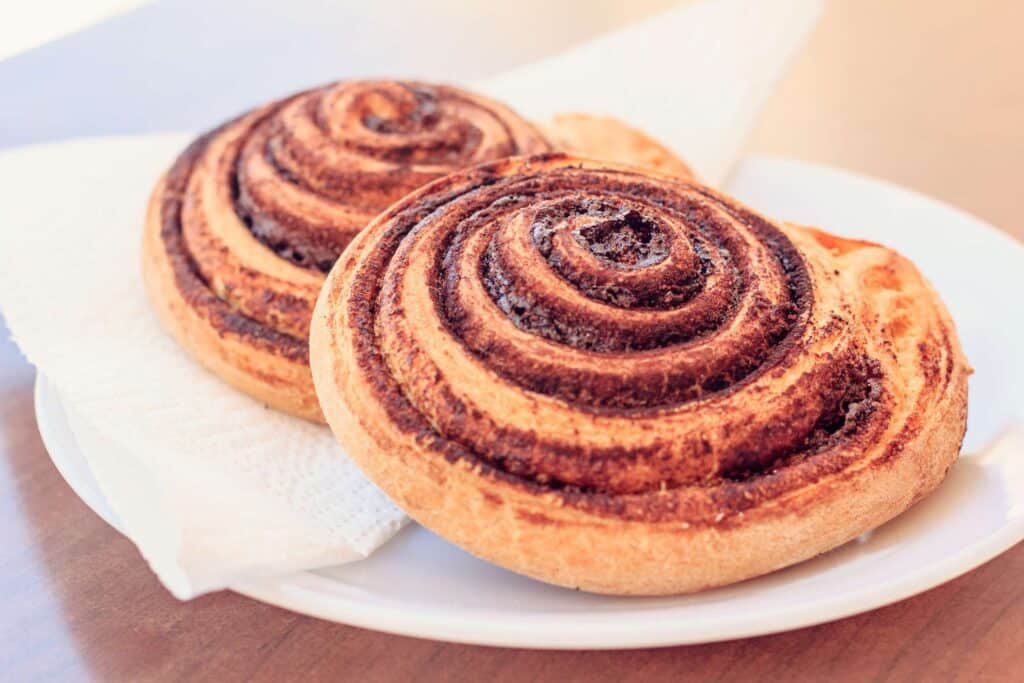Dogs frequently accompany their owners while they prepare baked goods like pumpkin pie or cinnamon rolls in the kitchen. They’ll continue to circle you to taste these sweet treats. Can dogs have cinnamon rolls? Given that dogs should not consume a diet high in sugar, you might want to think twice before giving them some crumbs. Ingredients like cinnamon, in addition to sucrose, can make you wonder.
Table of Contents
You may also be interested in: Can Dogs eat dill? Does dill poison dogs? 3 Benefits of dill for dogs

Does cinnamon poison dogs?
Despite being unhealthy for dogs, recipes like cinnamon rolls and buns are NOT poisonous. Dogs who consume a lot of cinnamon may experience skin and digestive irritation (and humans). The following signs could manifest if your dog consumed too much cinnamon (powder or oil).
- Diarrhea
- Vomiting
- Coughing
- Having trouble breathing
- A low blood sugar
More than one teaspoon of cinnamon powder will irritate most dogs, according to the Pet Poison Helpline. Even a smaller amount of cinnamon oil can result in sensitization. If you have a small dog breed, you should use this spice with extra caution.
Can Dogs Have Cinnamon Rolls?
Cinnamon can be beneficial to your companion’s health, provided you limit how much you consume.

Can dogs have cinnamon toast crunch
Maybe. Giving your dog a small amount of Cinnamon Toast Crunch as a snack will not harm him (unless he has diabetes), but the cereal does not contain nutrients that are good for his health. Cinnamon Toast Crunch is incredibly sweet and full of additives. It offers no nutritional benefits to you or your dog. It is definitely not a useful substitute for dog food; it will leave your dog malnourished and hungry. In general, cereal is less healthy than crunchy, grain-free dog treats like this one.
Mental Benefits
Cinnamon can enhance memory and cognitive abilities, which will aid in brain development. Due to the abundance of antioxidants, it can also prevent neurological disorders.
Heart Health Is Improved
A study found that cinnamon can lower canines’ blood pressure and heart rate. In this study, 10 healthy dogs were given cinnamon to eat for 14 days to observe how it affected their heart health. The researchers discovered that cinnamon enhanced all the measured parameters, including the P-R interval, after this experiment.
Effect of the Cinnamon on Dog’s Heart
After two years of growth, the tree is coppiced to harvest the cinnamon. A dozen or so shoots will emerge from the roots the following year. After the outer bark has been removed from the branches that have been cut in this manner, the inner bark is loosen by giving the branch an even hammering. Long rolls of the inner bark are then peeled off. Only the inner bark, which is only 0.5 mm (0.020 in) thick, is used; the outer, woody portion is discarded, leaving cinnamon strips that are several meters long and curl into rolls (quills) as they dry. The bark is cut into 5-10 cm (2.0-3.9 in) lengths once it has dried and is then sold.
The purpose of this study was to assess the effects of cinnamon on canine heart function, particularly as measured by Korotkoff sounds and electrocardiogram. 10 dogs between the ages of 2-3 were randomly chosen for the study. Prior to the start of the experiment, a clinical examination of the animal’s overall health was conducted. Each animal’s heart was also checked for any audible murmurs and any congenital or acquired heart conditions.
After that, cinnamon was fed to all animals for two weeks. Electrocardiogram and sphygmomanometric blood pressure were taken from the left brachial artery on day 14 and concurrent with the last extract administration at 2, 4, and 8 hours later. The electrocardiogram’s P-R interval, R wave amplitude, and Q-T segment were then measured. Researchers recommended using this medicinal plant because it improved all measured parameters in the study, which showed that cinnamon has a protective effect on heart performance. However, we suggest that more research is needed before approving this claim.
Can dogs have cinnamon sugar? Effective Against Diabetes and Obesity
Cinnamon also controls your dog’s insulin resistance and blood sugar levels, which is another advantage. For instance, cinnamon will reduce blood sugar levels if the dog has been fed a diet high in carbohydrates to maintain health. It is thought that 1/8 teaspoon of cinnamon will suffice for every 15 pounds of dog weight.
Good for Arthritis
One of the biggest issues an older dog may experience is arthritis and muscle soreness. Due to its anti-inflammatory qualities, cinnamon can be useful in treating these conditions. A small amount of this spice sprinkled on your dog’s food can aid in reducing inflammation and joint pain. NOTE: Despite these advantages, cinnamon can be dangerous for some dogs as it can lead to rashes and diarrhea. As a result, it is strongly advised that you consult your veterinarian before adding this ingredient to your dog’s food.
A dog and a cinnamon roll
Does your dog allow cinnamon rolls? Even though cinnamon is NOT toxic to dogs, these rolls COULD hurt your pet. All of these baked goods, whether they are cinnamon rolls or holiday cookies, can be harmful to your pet. These treats contain a lot of additional ingredients that are not entirely safe for your puppy.
Can dogs have nutmeg?
Nutmeg is a crucial ingredient in these holiday treats, just like cinnamon. Dogs who consume this spice may experience severe medical effects like seizures and hallucinations. Similar to this, cinnamon rolls may contain potentially fatal components like raisins and macadamia nuts.
The small amount of nutmeg used in recipes is extremely unlikely to cause serious toxicity, but if a small amount is consumed, mild stomach upset could happen. Myristicin toxicity, which can happen if a lot of nutmeg is consumed, can result in hallucinations, confusion, an elevated heart rate, high blood pressure, dry mouth, abdominal pain, and even seizures. Up to 48 hours may pass between symptoms. If a dog or cat eats food that contains nutmeg, they would need to consume a very large amount of the spice for this to happen.
Another common ingredient in baked goods that is toxic to dogs is chocolate. Because dogs cannot break down theobromine, it is not suitable for canine consumption. Likewise, your dog should not consume artificial sweeteners like Xylitol.
Sugar and fats are always present in cinnamon rolls, even when all these ingredients are absent. Both of these substances have a greater potential to result in painful and potentially fatal pancreatitis.
Because of this, it’s best to refrain from sharing cinnamon rolls with your partner. As an alternative, you could provide them with some delectable homemade treats to enjoy the festivities.
My dog ate a cinnamon roll
When your dog asks to share your holiday treats, it can be difficult to say no to his cuteness. Knowing the repercussions, it is NEVER advised to succumb to those foolish actions. Instead, you should make some secure dog treats as a special gesture for him or her.
Dog treats with peanut butter and pumpkin
It is well known that one of the dogs’ favorite foods is peanut butter. Similar to how your dog’s attraction to pumpkin pie shows how much it loves pumpkin. For some delicious treats for your pet, mix these ingredients with some cinnamon.

Ingredients:
- 2 1/2 cups of whole wheat flour
- 2 eggs
- 0.5 cups of canned pumpkin
- 2 teaspoons of peanut butter
- 1/2 tsp. of cinnamon powder
Directions
- Preheat oven to 350 degrees F (175 degrees C).
- In a bowl, combine the cinnamon, salt, pumpkin, peanut butter, and flour. To help make the dough workable, add water as necessary, but the dough should be dry and stiff. Create a 1/2-inch-thick rollout of the dough. Slice into 1/2-inch-long pieces.
- Bake in the preheated oven until hard (about 40 minutes).
Related Post